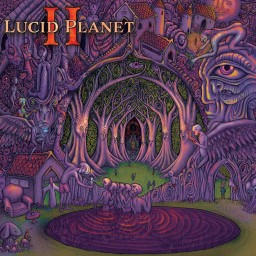Reviews list for Lucid Planet - Lucid Planet II (2020)
There comes a time in every prog snob's lifetime where they have to separate the technicality of the music from the actual quality. For far too long, I have found myself being overly favorable to progressive rock/metal albums for the sole purpose of "yep, this doesn't sound anything like what you hear on the radio!" despite the fact that in the lexicon of progressive music, an album may sound formulaic. With that being said, I can honestly say that I have never heard ANYTHING that sounds remotely close to Lucid Planet in my lifetime. The closest comparison that I can make is if you took the psychedelic's and post-metal of early 2000s Tool and combined it with some Orphaned Land and perhaps some of the modern electronic trends that have been plaguing a lot of alternative metal bands in recent years; most notably Bring Me The Horizon, Architects and Bullet For My Valentine. And even then that still does not even scratch the surface!
Lucid Planet II is an intoxicating album which sees the band mess around the spectrum of psychedelic music with a record that never feels like it is confined to the label of "Metal". How appropriate since Tool feels very much the same way. They use sitar, tabla, strings, digeridoo and various other horns throughout the mix. While certain interlude passages incorporate electronic percussion in addition to acoustic parts. The electric guitars are sparse and do not play a super important role as they would on say an early 2000s Opeth record. It all comes together into a nicely fit package that defies the laws of progressive metal, emphasis on the word "metal".
Because unlike many of Lucid Planet's contemporaries, this is a band that cares about their interludes, if you can even call them that. In comparison to songs like "Organic Hard Drive" and "Face the Sun", "Entrancement" "Offer" and "Digital Ritual" are significantly shorter and contain very little of the metal tones that exist on the albums longer tracks. And I'll be damned if they aren't some of the best interludes I've heard on any album in quite some time! "Entrancement" lives up to its title by starting very ambient and peaceful, but gradually building up intensity through dynamics, but also adding significant percussion and vocals to the mix and growing as a whole and never becoming stale. I also really dig "Digital Ritual": while the first half is very ritualistic, the flip of glitchy percussion and bombastic synths on the second half sounds incredible!
But outside of the interludes, the rest of the album is very solid as well. The opener "Anamnesis" splits the difference between Lateralus era Tool and Katatonia, which carries into "Organic Hard Drive". While "Face the Sun" and "Zenith" end the album on a trance induced high note that is quite stunning in its follow through of all of the ideas put forth up to this point, and flowing one into the next without feeling chopped up and poorly balanced together. Another thing that Lucid Planet are able to pull off incredibly well on this album is seamless transitions. Like with a lot of progressive/technical albums with so many uncommon time signatures, it can become very difficult to make moving between themes sound fluent. This album has plenty of moments that will make you wonder "how the hell did we get from point A to point B and I didn't even notice!" The one that I picked up on was the flawless transition from triplets to sixteenth notes on "On the Way".
Where I will knock a couple of points back from Lucid Planet II is that some of the longer songs do not feel as memorable as even some of Tool's longer songs. But where Lucid Planet makes up for that is in the incredible interludes and simple repetitive motifs that persist throughout songs and in some cases, throughout the entire album.
At the beginning, I mentioned how prog snobs need to get over the fact that their music sounds nothing like radio friendly rock/metal and that the technicality does not automatically make an album a classic. With that being said, Lucid Planet's sophomore album is one in which I feel its unique charm plays into its benefit. Nothing else sounds like this and I highly doubt that anything will ever sound like this. It borrows from all over the spectrum of psychedelia and creates a new entity that is just as intoxicating as the sum of its parts. If any of that descriptor interests you, then let Lucid Planet II take you on a journey unlike any other.
A Bio-Mechanical World
Progressive Metal used to be my genre growing up, but I feel as if I have to go elsewhere nowadays to get the same sorts of twists and turns that used to excite me. Thirty-ish years into the genre’s supposed inception the label itself is becoming a bit disingenuous, leading listeners into a likely trap that promises something new, complex, impressive, or intricate. More often than not I find myself looking to Technical Death and Thrash or the more avant-garde side of Black Metal to provide most of the cutting-edge additions for Metal over something that’s literally named for supposedly progressing the genre. While a good portion of Progressive Metal feels sadly shackled to its predecessors, there’s always going to be a group or two who refuse to remain stagnant and quietly release fresh and exciting content for people lucky enough to stumble upon it. In 2020 that group for me was Lucid Planet, who were a quick and nonchalant recommendation from a coworker that I didn’t exactly rush around to get to at the time. When I finally did it was clear that Lucid Planet II was one of the most unique and impressive albums of 2020, as shown by its top 20 placing on my list, but returning to it with some hindsight shows that this album still has a ton of life left in it.
I’ll only reference Tool once since it’s important, but want to get it out of the way early. Lucid Planet’s 2015 debut, self-titled album showed that they were a band that was heavily influenced by said aforementioned band to a point where it was an obvious crutch for them. Unlike other clones, though, these Australians showed some serious promise since they chose to focus on some of Tool’s stranger and more atmospheric tendencies more than anything else, allowing them to fully transition into their own with Lucid Planet II. Within the span of one album, they’ve managed to carve out a fantastic spot for themselves by doubling, if not tripling down on the aspects of their music that made them unique in the first place rather than taking the easy path down the weathered road, worn down by the travels of many other Progressive Metal bands. These aspects range anywhere from psychedelia, tribal, or electronica and meld together into a product that is absolutely dripping with character, atmosphere, and expression. I’m a massive fan of consistent theming when it comes to albums and Lucid Planet II delivers a wildly organic but somehow unnatural sounding meshing of concepts using mechanical sounding electronics fused with loose and psychedelic atmospheres. Through tracks like “Organic Hard Drive” and “Digital Ritual” Lucid Planet have really created their own alien landscape filled with slightly familiar qualities warped in a way that makes the listener feel uneasy but still awestruck by what’s around them, like walking aimlessly through a strange sort of forest on another planet.
This consistent natural versus mechanical atmosphere and feel of Lucid Planet II is what drives it forward and what makes the rest of the Progressive Metal riffing and solos have a ton more punch than they otherwise would. This album spends a lot of time on the low end, taking ample amounts of time to build up to each new section and riff introduction. While the album does have some great riffs and metal sections, most of the magic lies in the extended sections between them, combining tribal percussion with sputtering, warbling synths coupled with a clear sense of progression through the songwriting that makes it feel like each section that might sometimes be a bit too drawn out for its own good was worthwhile to sit through. Most of “Anamensis”, “Face the Sun”, and “Zenith” are comprised of these softer, more stripped down sections that explore all of these different tribal and electronic influences rather than hard-hitting riffs, even though they definitely pop up here and there. If anything, the biggest issue I have with Lucid Planet II isn’t necessarily about the atmospheric sections being too long, it’s the climaxes not sticking around for long enough. The buildups and transitions throughout Lucid Planet II are incredible, but it feels like the payoff for all the buildup doesn’t stick around for long enough for it to really make an impact sometimes. “Face the Sun” and the closer “Zenith” are especially guilty of this, even though I can understand the choice for “Zenith” to act as a climactic closer to the album. “Face the Sun” has about two minutes of total payoff over the course of a 12-minute track, plus an extra five minutes of electronic musings from “Digital Ritual” beforehand, and even though I love “Face the Sun’s” surprise Arabic turn I just wish there was more of it.
Even though Lucid Planet may not completely capitalize on their big moments, the smooth as silk transitions and progressions to get to those moments are entrancing. I believe that one of the most important aspects to having compelling atmospheric sections is never losing the groove of the concept you’re trying to convey, and Lucid Planet II showcases how to intricately progress an album through a plethora of styles without ever losing its footing. There’s a natural and freeform flow between everything that Lucid Planet writes that’s established in the first two songs, with “Anamensis” being a fantastic intro that sets the stage for what’s to come and “Entrancement” instantly turning the album on its head with its repetitive tribal chanting and percussion. Most of the tracks offer their own distinct twist though since Lucid Planet II barely repeats itself throughout its hour runtime, even with the more psychedelic and electronic breaks in “Digital Ritual” having a very different vibe than something like “Organic Hard Drive” or “Face the Sun”. The album doesn’t necessarily have a linear progression but it seems to start out more organic and grounded sounding with more tribal influences, but eventually shifts away towards a more spacey or heavenly feel starting at “Digital Ritual” and culminating with “Zenith”. The use of some harmonizing female vocals during certain sections help to add some spice as well, especially since Lucid Planet’s lead vocalist tends to sing to enhance the atmosphere rather than show off his pipes. To my ears there’s even a nod to a Ne Obliviscaris style violin in “Face the Sun”, which is something that I didn’t even pick up on until going to write this.
What’s left for Lucid Planet II is the actual Progressive Metal sections and while I don’t think they would hold up so well on their own, Lucid Planet’s songwriting and use of all their other strange elements highlights the riffs and bass grooves in a stellar way. The beginning of “On the Way” is probably the most traditional Progressive Metal example with its driving layered riffing and seamless transition into the atmospheric second half. The bass also has that satisfyingly poignant and plucky tone that is heavily inspired by that band that I refuse to name more than twice in this review. It’s tough because I think this is where Lucid Planet II falters the most since the big Progressive Metal moments are pretty fleeting given the length of the album, even though there are a ton of other small sections and riffs that are memorable. I still believe that this works in their favor, though, because the selling point of this album is it’s unnerving and alien aura. It’s an album with a lot of weird, earthy, and sometimes squishy sounds and influences that are wrangled up into an organic and cohesive project that has only gotten better with time for me personally. In a time where it feels like it’s difficult for Progressive Metal to progress, Lucid Planet has created an incredibly overlooked experience that is uniquely captivating and sleek through and through, even though it may not be for everyone due to how atmospherically focused it is.


 Saxy S
Saxy S
 Xephyr
Xephyr